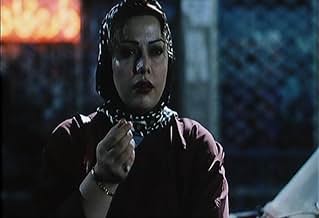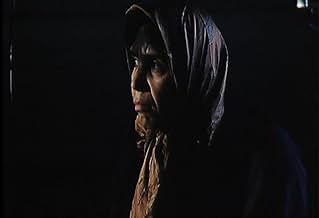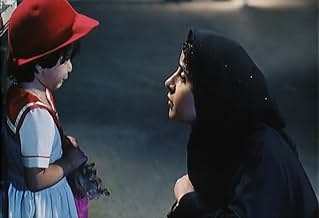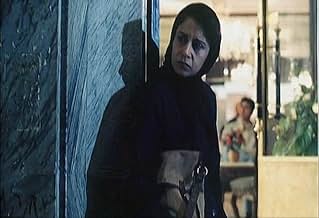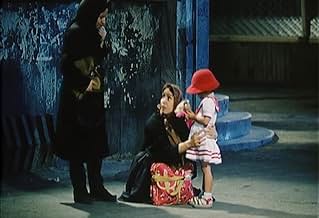IMDb-BEWERTUNG
7,4/10
7018
IHRE BEWERTUNG
Füge eine Handlung in deiner Sprache hinzuVarious women struggle to function in the oppressively sexist society of contemporary Iran.Various women struggle to function in the oppressively sexist society of contemporary Iran.Various women struggle to function in the oppressively sexist society of contemporary Iran.
- Regie
- Drehbuch
- Hauptbesetzung
- Auszeichnungen
- 12 Gewinne & 7 Nominierungen insgesamt
Maryiam Palvin Almani
- Maryam Parvin Almani (Arezou)
- (as Maryam Parvin Almani)
Fereshteh Sadre Orafaiy
- Fereshteh (Pari)
- (as Fereshteh Sadr Orafai)
Empfohlene Bewertungen
"The Circle" adds to the genre of grim, depressing, didactic feminist movies made by men on non-Anglo cultures that we have seen little on to challenge their viewpoint, such as the Israeli "Kadosh" and the Indian "Bandit Queen." Like the latter, it was banned in its home country, according to the film poster.
The beginning of "The Circle" felt like an out-of-kilter futuristic sci fi movie, as a few chadored women move through a male-crowded modern city (I presume Teheran) filled with the latest contemporary commercial goods.
And the revolutionary society of Iran shown here feels a lot like those futuristic sci fi movies and books influenced by "1984" that presumed that dictatorships of the future would control sex and feelings (as opposed to the dictatorship we actually have in the West of anything goes).
From the jolting opening that gradually challenges our expectations, the most creative part of the movie is how it very slowly reveals the background of each woman as each accidentally crosses paths with others (a similar technique is employed in "Amores Perres").
For each, the only thing that keeps them going is reaching out for female solidarity and support, which results from the regime accidentally throwing them together.
Everyone walking out of the theater turned to each other in unison and said "That was depressing!"
The beginning of "The Circle" felt like an out-of-kilter futuristic sci fi movie, as a few chadored women move through a male-crowded modern city (I presume Teheran) filled with the latest contemporary commercial goods.
And the revolutionary society of Iran shown here feels a lot like those futuristic sci fi movies and books influenced by "1984" that presumed that dictatorships of the future would control sex and feelings (as opposed to the dictatorship we actually have in the West of anything goes).
From the jolting opening that gradually challenges our expectations, the most creative part of the movie is how it very slowly reveals the background of each woman as each accidentally crosses paths with others (a similar technique is employed in "Amores Perres").
For each, the only thing that keeps them going is reaching out for female solidarity and support, which results from the regime accidentally throwing them together.
Everyone walking out of the theater turned to each other in unison and said "That was depressing!"
Devastating film that details the harsh treatment of women in Iran. The film begins with a hospital scene, where a family take the news of a new baby girl in the family so harshly that one would think the child had been stillborn. Following that the story introduces us to a group of women, one after the other, each of them recent convicts (in Iran a woman is put in jail indefinitely for riding in a car with a man she is not related to) who have their own struggles to overcome before they can seek asylum from the clausterphobic society that surrounds them. The film isn't as satisfying as it should be (even given its subject matter), and definitely deserves to be more engrossing. It is, however, an important human rights issue worth examining and for all it shows of a world as different from our North American society, it deserves a good look from us all.
In Jafar Panahi's claustral feature debut, the brilliant central conceit is that being a woman in Iran is exactly equivalent to being the Wrong Man in an Alfred Hitchcock movie. In the movie's nameless Iranian city, the narrative baton is handed off from one woman to another, each of them missing an ID card, a chaperoning male, some form of social validation; without it, the long arm of the law winds around each woman like a python. Panahi's style--long, fluid takes that are at once bruisingly verite and dreamlike--buckles in the script's ingenious (and perhaps unconscious) major device: in this movie, women are a secret underworld with nodding, unspoken signals, just like hoodlums silently acknowledging one another in a gangster picture. There is no warm-hug sisterhood here, just the desperate mutual regard of the about-to-be-caught.
The honesty and unfussiness of the style of contemporary Iranian directors enables them to get away with stuff other artists might not, such as the ending of this movie, which, in a European or American movie, might seem thuddingly unsubtle. Here, it seems like the fulfillment of a nightmare--and it works because of Panahi's wittily blunt style, which is pitched somewhere between Iranian neorealism and Elaine May's MIKEY AND NICKY. And it works because of our constant recognition of the literal, physical courage of the movie: our glimpses of current state attitudes toward abortion, prostitution and corrupt police are so bald one marvels at Panahi's (and the cast and crew's) effrontery. Never has chador seemed less exotic and more evil--a manifestation of a terror of the beauty and pleasure of the female body that seems to engulf each character like a Cronenbergian plague. (The movie's wittiest touch is Cronenbergian, too: a woman character has a tic that gives her away to the cops--pregnancy-induced vomiting.)
The honesty and unfussiness of the style of contemporary Iranian directors enables them to get away with stuff other artists might not, such as the ending of this movie, which, in a European or American movie, might seem thuddingly unsubtle. Here, it seems like the fulfillment of a nightmare--and it works because of Panahi's wittily blunt style, which is pitched somewhere between Iranian neorealism and Elaine May's MIKEY AND NICKY. And it works because of our constant recognition of the literal, physical courage of the movie: our glimpses of current state attitudes toward abortion, prostitution and corrupt police are so bald one marvels at Panahi's (and the cast and crew's) effrontery. Never has chador seemed less exotic and more evil--a manifestation of a terror of the beauty and pleasure of the female body that seems to engulf each character like a Cronenbergian plague. (The movie's wittiest touch is Cronenbergian, too: a woman character has a tic that gives her away to the cops--pregnancy-induced vomiting.)
A baby girl is born, and the grandmother regrets for the sex of the baby. Three women are released under probation from the jail and get lost into the crowd, without courage to come back home and having no money. A woman escape from the jail to make an abort and is expelled from her own home by her family. Another woman left her daughter of about six years old alone on the street. A prostitute is arrested with her client in his car, and the man is released by the police later while the woman goes to jail. All of these individuals and disconnected situations are presented to show the repressive situation against the women in the Iranian society. In the end, like in a circle, all of them ends arrested in the jail. I am not aware of the behavior of the Iranian society with their women, but this movie portraits a horrible picture. The women are showed without freedom, depending on her husband or her family even for simple actions, like traveling in a bus. If their society works this way, how are these actresses daily treated after their performances in this movie? The camera and the direction are excellent. It is amazing the capability of the Iranian filmmakers in making simple but touching films. My vote is eight.
Title (Brazil): `O Círculo' (`The Circle')
Title (Brazil): `O Círculo' (`The Circle')
After making two feature films and many short films on children, director Jafar Panahi makes a film The Circle where he deals with the condition of a wider gamut of the female gender (a girl child, a girl toddler left behind for adoption. a wide-eyed teenage girl, a pregnant mother whose spouse has been executed, a prostitute, the only wife of an expatriate doctor, the less-preferred first wife of a husband with two wives, a grandmother who wishes for a male grandchild, a possibly unmarried mother who can no longer support her girl child) in Iran.
"The circle" begins and ends with a name of a woman--Solmaz Gholami--being called out through a door hatch. Interestingly, the film never introduces us to this character. It is apparently the name of a woman who has given birth to a girl child. The film introduces us to the grandmother of the child who is informed by the nurse that the newborn is a girl. The hatch belongs to a white door of an operation theater in a hospital.
The film ends with the same name being called out from a similar hatch of another doorthis time a prison door of a room that holds most of the female adult characters in the film rounded up for varied offenses. Implicitly the film states that women face discrimination from birth until death in Iran. Evidently someone had stated a white lie earlier that the unseen Ms Gholami was to have a baby boy after an ultrasound test of the foetus. The revised information of the arrival of the girl child upsets the grandmother who wants a boy grandchild.
In between the opening of the two hatches, the roving hand-held camera underlines the state of an unusual group of women in Teheran, without IDs or male support evading police and eve-teasing males. The viewer is informed that most of the women (except the grandmother and two children) have either been paroled from prison or have escaped prison and are therefore on the run from the cops. Their original crimes are never stated. One woman is picked up by the police while she is making a call from a public phone booth. Once imprisoned, the women are afraid of the blot in their lives to the extent that they hide it from their husbands! Were they imprisoned for sexual offenses? None of the women seem to be politically active. However, the film underlines one fact-had they either a husband or a father, or even a student ID, they would have no problem. Some of these women who want to smoke a cigarette. They can only do so when the men (in the film, a policeman) are smoking in public!
Mr Panahi is able to present interesting aspects of intra-female bonding in Iran. Some women travel the extra mile to help other women in distress. Even a prostitute helps another woman to escape the police. Then there are women who do not help others because they do not want their husbands to know that they were once behind bars. A mother leaves her girl child in the street in the hope that a stranger will provide a better life for her child. Yet they do not wallow in self pity. Who are these women with no husbands and having shady pasts? They are definitely not the typical Iranian woman.
Any woman or sensitive man could be seduced by the subject of the film. However, the film ought to be evaluated beyond the obvious feminist issues-it is a study of individuals born into any society that deprives them of equal privileges. One of the reasons for my argument is that many men shown in the film are caring men who help women in trouble rather than become their exploiters. Some policemen shown are corrupt, but some are decent chaps. Many men in the film do respect women. There are also intolerant men who are ready to kill their sister who is pregnant without a husband. "The circle" cannot be a feminist film merely just because the female form covered in burkha/chador indicates repression. The film is more humanist than feministwhich the director has claimed in interviews. One tends to agree with Mr Panahi on this point.
However, it is a fact that to abort a child in Iran is a difficult proposition as it would be in most countries today. It would be difficult in most countries for any young girl without an ID to take a long distance bus ride all alone in the night. Iranian women enjoy more relative freedom than their counterparts in Saudi Arabiawhere women cannot even drive a car! Panahi's women in "The Circle" seem to be women who were incarcerated for some "unknown" crimes-never clearly elucidated in the film except in the case of the prostitute. If they were political prisoners, there is no clue except that a pregnant woman states that her spouse has been recently executed for a crime. There is a wide eyed girl who has never seen her village in recent years, who makes the viewer wonder why she was imprisoned in the first place. Panahi's film seduces the viewer, until you begin to wonder, if even the fact that the film was banned in Iran, is a viewer-seduction tool (almost all good Iranian films are banned in Iran, even though they have no sex or violence, but are possibly remotely critical of the present regime). The film was shot in Teheran and evidently the government did not have any problems at that time with the script. And then, bingo, it gets banned!
"The circle" is an interesting film that offers considerable fodder for thought. As cinema, it is without doubt an intelligent work and deserved the Golden Lion at the Venice film festival. Yet it is a film that calls for close evaluation by an astute mind rather than the heart of an impartial impressionable viewer.
"The circle" begins and ends with a name of a woman--Solmaz Gholami--being called out through a door hatch. Interestingly, the film never introduces us to this character. It is apparently the name of a woman who has given birth to a girl child. The film introduces us to the grandmother of the child who is informed by the nurse that the newborn is a girl. The hatch belongs to a white door of an operation theater in a hospital.
The film ends with the same name being called out from a similar hatch of another doorthis time a prison door of a room that holds most of the female adult characters in the film rounded up for varied offenses. Implicitly the film states that women face discrimination from birth until death in Iran. Evidently someone had stated a white lie earlier that the unseen Ms Gholami was to have a baby boy after an ultrasound test of the foetus. The revised information of the arrival of the girl child upsets the grandmother who wants a boy grandchild.
In between the opening of the two hatches, the roving hand-held camera underlines the state of an unusual group of women in Teheran, without IDs or male support evading police and eve-teasing males. The viewer is informed that most of the women (except the grandmother and two children) have either been paroled from prison or have escaped prison and are therefore on the run from the cops. Their original crimes are never stated. One woman is picked up by the police while she is making a call from a public phone booth. Once imprisoned, the women are afraid of the blot in their lives to the extent that they hide it from their husbands! Were they imprisoned for sexual offenses? None of the women seem to be politically active. However, the film underlines one fact-had they either a husband or a father, or even a student ID, they would have no problem. Some of these women who want to smoke a cigarette. They can only do so when the men (in the film, a policeman) are smoking in public!
Mr Panahi is able to present interesting aspects of intra-female bonding in Iran. Some women travel the extra mile to help other women in distress. Even a prostitute helps another woman to escape the police. Then there are women who do not help others because they do not want their husbands to know that they were once behind bars. A mother leaves her girl child in the street in the hope that a stranger will provide a better life for her child. Yet they do not wallow in self pity. Who are these women with no husbands and having shady pasts? They are definitely not the typical Iranian woman.
Any woman or sensitive man could be seduced by the subject of the film. However, the film ought to be evaluated beyond the obvious feminist issues-it is a study of individuals born into any society that deprives them of equal privileges. One of the reasons for my argument is that many men shown in the film are caring men who help women in trouble rather than become their exploiters. Some policemen shown are corrupt, but some are decent chaps. Many men in the film do respect women. There are also intolerant men who are ready to kill their sister who is pregnant without a husband. "The circle" cannot be a feminist film merely just because the female form covered in burkha/chador indicates repression. The film is more humanist than feministwhich the director has claimed in interviews. One tends to agree with Mr Panahi on this point.
However, it is a fact that to abort a child in Iran is a difficult proposition as it would be in most countries today. It would be difficult in most countries for any young girl without an ID to take a long distance bus ride all alone in the night. Iranian women enjoy more relative freedom than their counterparts in Saudi Arabiawhere women cannot even drive a car! Panahi's women in "The Circle" seem to be women who were incarcerated for some "unknown" crimes-never clearly elucidated in the film except in the case of the prostitute. If they were political prisoners, there is no clue except that a pregnant woman states that her spouse has been recently executed for a crime. There is a wide eyed girl who has never seen her village in recent years, who makes the viewer wonder why she was imprisoned in the first place. Panahi's film seduces the viewer, until you begin to wonder, if even the fact that the film was banned in Iran, is a viewer-seduction tool (almost all good Iranian films are banned in Iran, even though they have no sex or violence, but are possibly remotely critical of the present regime). The film was shot in Teheran and evidently the government did not have any problems at that time with the script. And then, bingo, it gets banned!
"The circle" is an interesting film that offers considerable fodder for thought. As cinema, it is without doubt an intelligent work and deserved the Golden Lion at the Venice film festival. Yet it is a film that calls for close evaluation by an astute mind rather than the heart of an impartial impressionable viewer.
Wusstest du schon
- WissenswertesPanahi adopted a different camera style to depict each of the four main protagonists' lives. For the first, an idealistic woman he used a handheld camera. For the second woman, the camera is mounted on a constantly moving dolly. The third woman's story is told at night in darker outside, and the camera is static with pans and tight close ups. For the last, least optimistic woman both the camera and the woman are completely immobile and very little sound is used.
- VerbindungenFeatured in Cinema Iran (2005)
Top-Auswahl
Melde dich zum Bewerten an und greife auf die Watchlist für personalisierte Empfehlungen zu.
- How long is The Circle?Powered by Alexa
Details
- Erscheinungsdatum
- Herkunftsländer
- Offizieller Standort
- Sprache
- Auch bekannt als
- The Circle
- Drehorte
- Produktionsfirmen
- Weitere beteiligte Unternehmen bei IMDbPro anzeigen
Box Office
- Budget
- 10.000 $ (geschätzt)
- Bruttoertrag in den USA und Kanada
- 440.554 $
- Weltweiter Bruttoertrag
- 756.035 $
Zu dieser Seite beitragen
Bearbeitung vorschlagen oder fehlenden Inhalt hinzufügen


